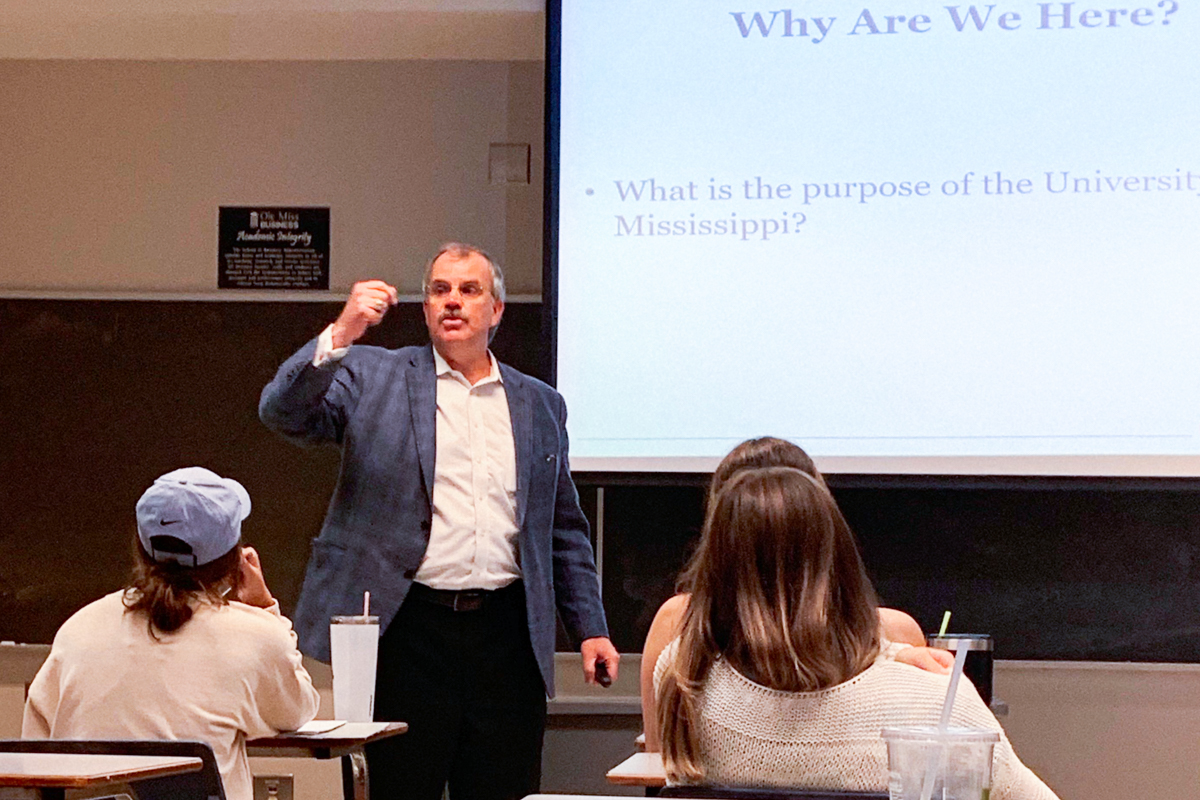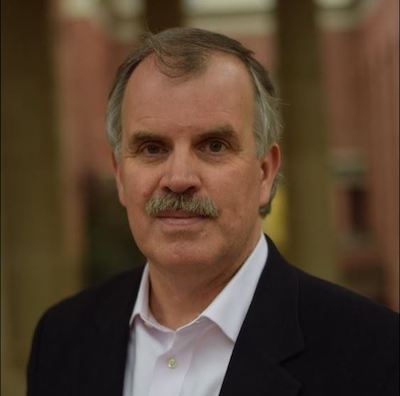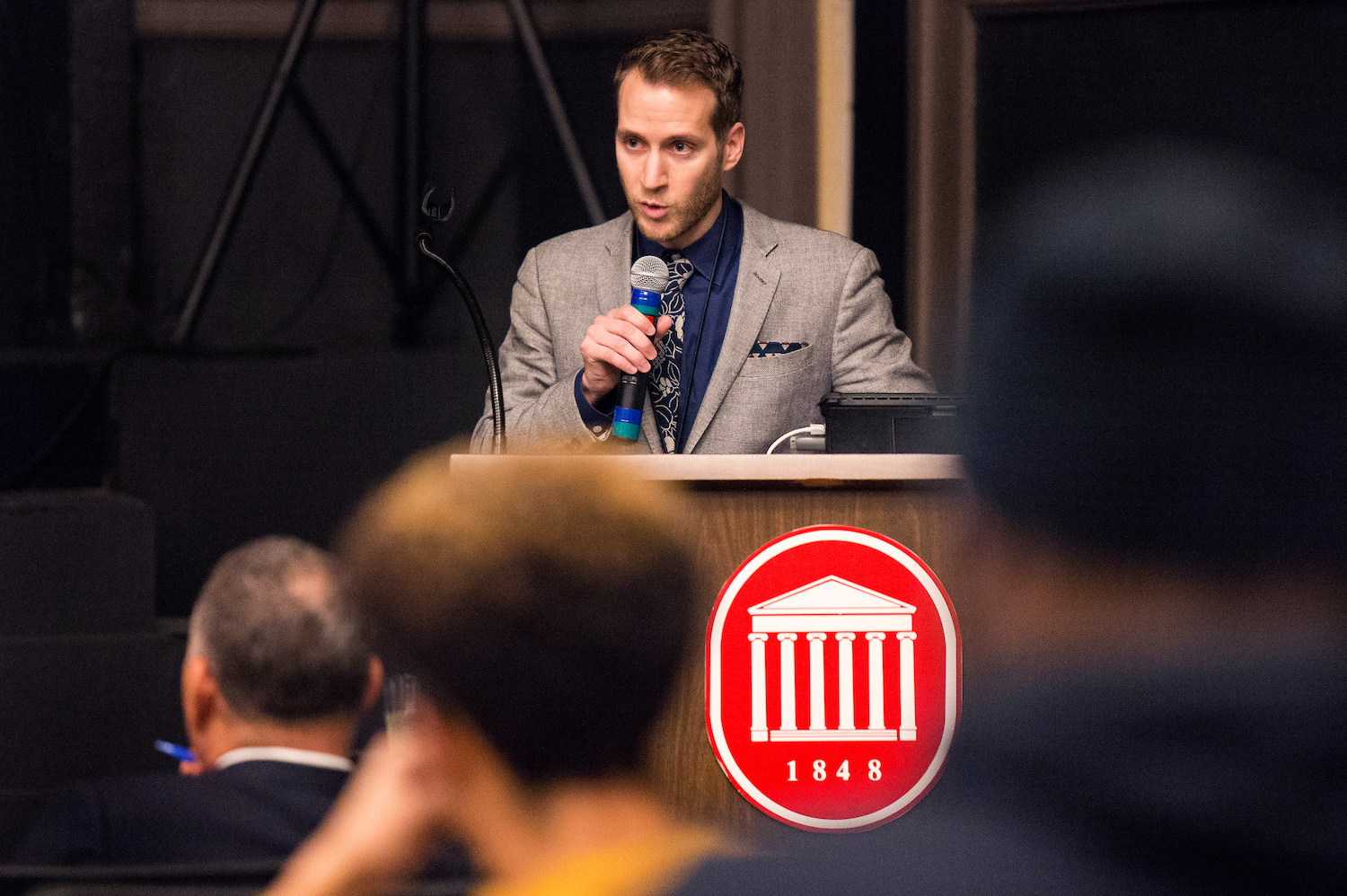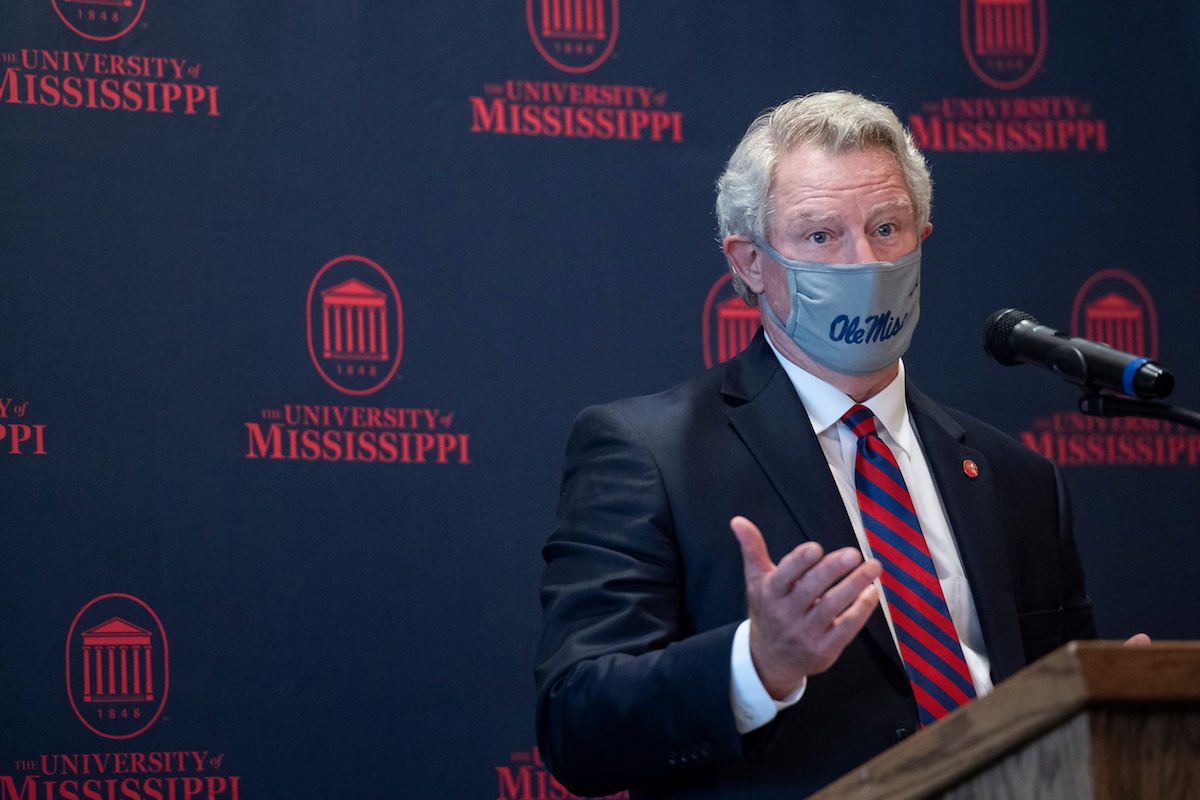Concerns grew among some faculty members at the University of Mississippi today after Chancellor Glenn Boyce announced he had appointed William W. Berry III, a longtime law professor in the UM school of law, as the university’s new acting ombudsman.
The appointment comes just over two weeks after the chancellor placed the current ombudsman, Paul Caffera, on administrative leave without offering any formal justification. Caffera sued the university in November to block officials from compelling him to turn over information after officials sought his assistance in their efforts to unmask the “UM Emails” whistleblowers who revealed racist, sexist, and homophobic communications between school officials and wealthy donors.

“They just got rid of a guy who refused to cooperate with them in hunting down these whistleblowers, so I am only left to think that they would not appoint somebody else like that who would refuse to cooperate,” Aaron Jones, a faculty member whose name has been changed to protect their identity, told the Mississippi Free Press today. “I don’t want to besmirch Barry. I don’t know anything about him, but everything that has happened behind this makes it very sketchy.”
Earlier this month, before news broke that Caffera had been put on administrative leave, another anonymous faculty member, Ruth Ford, told this publication that “Paul Caffera is the only place women can go and talk about their concerns on campus” and that people “would be terrified of speaking up” if the administration removed him.
Jones and other faculty members say Acting Ombudsman Berry’s status as an employee of 13 years and his various roles on campus conflict with the purpose of the ombudsman position, which is to give faculty, staff and graduate students a neutral, confidential place to raise concerns about issues on campus.
Antonia Eliason, who has been a member of the law-school faculty since 2013, told the Mississippi Free Press this evening that she is troubled by Boyce’s decision to appoint her colleague to the role. But she stressed that those concerns are not “a critique of my colleague’s character.”
“I think he would be a great ombudsman—at another university,” she said. Her issue is with the university’s decision to appoint a faculty member—any faculty member, Eliason noted.
“Will Berry could be Jimmy f*cking Carter and be the greatest saint that ever existed—this has nothing to do with him,” she said. “In no way am I impugning his ability to neutrally work. But there’s an issue that if somebody has a workplace complaint in the law school, then they’re not going to feel comfortable going with a complaint to the ombudsman if the ombudsman is a tenured faculty member. So that takes away any recourse a law school faculty member would have with the ombudsman. That has a chilling effect.”
‘The Integrity of That Office is Now in Question’
The International Ombudsman Association’s Code of Ethics says the role of an ombudsperson must be “independent in structure, function and appearance to the highest degree within the organization” and that those who hold the position must remain “neutral … unaligned and impartial.”
But Berry is a member of the university’s Academic Discipline Committee, which could create conflicts for graduate students who seek to bring concerns to the Office of Ombuds.
“He needs to step down from that for sure. If a student had a problem, a student wouldn’t feel comfortable going to that person, nor would a faculty member,” Jones said. “So he’s got conflicting duties on campus and a conflict of interest. This particular person is really deeply interconnected throughout the university. And we need an objective ombudsman. Someone who can stand apart in order to really evaluate anybody’s issues.”
Some UM faculty members also worry that they would not feel comfortable raising concerns about administrators in the Ombuds Office after Boyce’s unilateral appointment of Berry. Normally, the university would form a campus search committee involving faculty, graduate, and staff stakeholders from across the campus and pick a replacement through a rigorous process.
“The reason it’s troubling is because, with what has happened with the Ombuds Office, I think the integrity of that office is now in question,” Jones said. “And I’d feel much better if it was an outside person that came in through a more transparent appointment process, even if it’s interim.”

UM officials declined to speak to the Mississippi Free Press by phone for this story. Instead, Rod Guajardo, the associate director of strategic communications for the university, emailed a statement in which he noted that the International Ombudsman Association’s standards of practice directs that “(t)he Ombudsman holds no other position within the organization which might compromise independence.”
“This standard is designed to ensure that the ombuds doesn’t hold a position that could influence their decision-making. In fact, a number of universities around the country, including the University of Michigan, Mississippi State University, and the University of Texas have faculty members who served as ombuds, and attorneys serve as ombuds as well on other campuses,” Guajardo said.
“Dr. Berry’s role will require him to diligently consider any possible conflicts and disclose and manage those if they do arise. Given his experience as an attorney, we have full confidence he will do that effectively while serving in this important role for the university.”
Berry did not respond to a request for comment earlier today.
In his announcement today, Boyce praised the new acting ombudsman, saying “he is passionate about the need for an independent, confidential office where faculty, staff and graduate students can seek assistance with campus-related concerns, problems and disputes.” The chancellor highlighted the fact that Berry served on the Faculty Senate subcommittee that created the Office of University Ombuds.
“The university values the Office of the University Ombuds, which provides faculty, staff and graduate students with a confidential neutral, independent and informal place to seek assistance voluntarily in bringing forth and resolving campus-related concerns, problems or disputes,” Boyce said. “This office helps ensure that every voice at the University of Mississippi can be heard, without fear of loss of privacy, retaliation or retribution.”
But in a post on the International Ombudsman Association’s blog today, the organization’s executive director, Chuck Howard, and its president, Melanie Jagneaux, raised concerns.
“It appears that the university has not honored its obligation to respect the confidentiality of its ombuds’ communications with visitors, an issue which is of great concern to IOA and all of its members,” the IOA leaders said, noting that they have been in contact with Caffera. “Please be assured that IOA leadership has offered to provide Paul any support it can in this matter and will continue to monitor the situation.”
‘Under No Circumstances Would I Go to the Ombuds Office Now’
Jones, who has confidentially sought the ombudsman’s counsel regarding employment issues in the past out of fear of retaliation if they took their concerns elsewhere, told the Mississippi Free Press today that they would not feel comfortable going to the acting appointee for help.
“No. That’s a categorical no,” the anonymous faculty member said. “Under no circumstances would I go to the ombuds office now. And it has nothing to do with Berry. It has to do with what’s happened and with them trying to force Paul to reveal the names of the people that have come to him.”
By afternoon, the university had scrubbed photos and mentions of Ombudsman Caffera, who still holds the position, from the official UM Office of Ombuds website, which now lists Berry’s name.
Caffera’s attorney, Goodloe Lewis, told the Mississippi Free Press today that neither he nor the current ombudsman, who continues to receive pay but is not allowed to work, were notified of the appointment by university officials before Boyce made the announcement. Caffera’s contract runs through July.
After Boyce announced in an email to faculty that he was searching for an interim ombuds on Tuesday, some noted that the chancellor had made no mention of Caffera or that he still held the position.
“It sounds like he was disappeared. ‘Who is Paul Caffera? There’s never been anyone working here by that name,’” UM history professor Jesse Cromwell tweeted.
Rod Guajardo, the UM spokesman, told this publication on Dec. 16 via statement that “Paul Caffera has been advised through his attorney that he continues to be employed by the university.”
‘No Reason or Justification’
In October, UM School of Journalism and New Media faculty and staff filed a claim against the whistleblowers with the EORC, the Title IX enforcement organization that handles issues related to employment discrimination. The EORC is investigating vague claims that the whistleblowers are creating a “hostile work environment … on the basis of race and national origin and just in general.”
On Nov. 20, Caffera and his attorney participated in an interview with Equal Opportunity & Regulatory Compliance Interim Director Gene Rowzee. Caffera, who says he does not know the identity of the whistleblowers, declined to turn over information about visitors to his office.

His attorney, Lewis, told the Mississippi Free Press earlier this month that the 2015 University of Mississippi charter that established the Office of Ombuds “expressly prohibits Mr. Caffera’s disclosure of the identity of persons using the Office of Ombuds, as well as any information they provide, except to prevent imminent harm.”
Caffera filed a lawsuit to stop UM from forcing him to disclose information in a Lafayette County chancery court on Nov. 19, and the Mississippi Attorney General’s office served the complaint to the university on Nov. 23—three days before the Thanksgiving holiday.
On Nov. 30, the Monday after Thanksgiving, Chancellor Boyce cancelled a planned face-to-face meeting with Caffera. Later that day, Boyce sent Caffera an email informing him that the university was placing him on administrative leave starting Dec. 1.
“No reason or justification (was) provided other than the pendency of the EO/RC investigation, which had been going on for several weeks at this point,” Lewis told the Mississippi Free Press on Dec. 15. “The university did not then and has not now pointed to any specific wrongdoing on Mr. Caffera’s part.”
The 2015 ombuds charter says “the university shall not tolerate retaliation against individuals for use of the Office of the Ombudsperson” and that “the ombudsperson shall be protected from retaliation as a result of his/her role.”
Neither the university or the EORC has leveled specific charges against Caffera or offered any evidence that he participated in the whistleblowers’ efforts, which some on campus and in the journalism school claimed created a “hostile work environment.”
The emails the whistleblowers procured through a public-records request in the spring contained revelations about racist, sexist and homophobic emails inside the journalism school that presaged former Journalism Dean Will Norton’s resignation. Since, the EORC has insinuated, without evidence, that the whistleblowers themselves may be targeting some faculty members on the basis of their race or national origin.
‘An Apparatus to Silence, Intimidate or Disappear People’
Jones, the anonymous UM faculty member (who is not a member of the journalism school), told the Mississippi Free Press that they and many others on campus are facing an increasing climate “of uncertainty, paranoia distrust with administrators.” Some, they said, fear outspoken faculty members may become targets of an academic “purge” under the guise of budget cuts necessitated by the COVID-19-era economic downturn.
“There’s an apparatus in place to silence, intimidate or disappear people. And it’s dastardly,” Jones told the Mississippi Free Press today.
Last year, before the whistleblower began contacting faculty members, a UM survey on the campus social climate revealed that 60% of university faculty and 55% of staff members had considered leaving the university in the past year, with many describing alleged incidents of corruption or sexual harassment.
Caffera’s potential ouster comes amid a series of investigations of UM faculty members and whistleblowers who have spoken up about issues of race, sex and other issues on campus.
Chancellor Boyce was already ensnared in a controversy surrounding James Thomas, a sociology professor whom Mississippi State Auditor Shad White has accused of breaking the law by participating in the two-day anti-racist “Scholar Strike.”
Thomas, through his attorney, has denied that he broke any law. Still, Boyce has declined to defend the sociologist and, instead, turned over Thomas’ class rosters, lesson plans and documentation of online class discussions to the auditor for his investigation.
Boyce’s 2019 hiring came after former Chancellor Jeffrey Vitter’s forced resignation in late 2018. In the weeks before Vitter stepped down, university officials, including those charged with procuring donations from wealthy alums, were inundated with angry letters from monied prospects demanding Vitter’s removal after tense debates over efforts to change Confederate iconography and take racist names over campus buildings, among other controversies.

A number of the wealthy alums, outraged at the sociologist’s public outspokenness on left-wing causes and racial issues, cited Thomas’ continued employment as one of several factors in their dissatisfaction with Vitter.
Blake Tartt, an 1984 alum whose racist emails with former journalism Dean Will Norton were among those procured by the UM Emails whistleblowers, served on the 2019 IHL committee that picked Boyce as Vitter’s replacement.
In August, the Mississippi Free Press reported on a leaked September 2018 recording that revealed a number of people in the school were aware of Tartt’s role in a controversy that centered around journalism school donor and former namesake Ed Meek.
In one September 2018 email, which the whistleblowers UM officials are investigating obtained through a public records request, Tartt sent Norton photos of Black women who were dressed for a night out in Oxford.
“You know Oxford and Ole Miss have real problems when black hookers are working on Jackson avenue,” Tartt wrote.
“Blake, I have been really disappointed for a long time with the way this culture is going,” the journalism dean wrote back.
Days later, Norton publicly condemned Meek for posting Tartt’s photo with a similar, though less blatant, caption on Facebook and called for his name to be removed from the school. But the journalism school dean, like others in the school and at UM, kept silent about Tartt’s role in the photos, and continued courting him for donations even as the 1984 alum and real-estate businessman continued to email him with similarly racist comments, such as using an ape emoji to refer to tennis star Serena Williams.
Norton continued to be silent about the emails and Tartt’s role in the Meek affair when the businessman received an appointment to the committee that ultimately selected Boyce.
Felber: UM ‘Prioritizes Racist Donors Over All Else’
On Tuesday, the Mississippi Free Press’ Christian Middleton broke the story that the university has terminated Garrett Felber, a tenure-track assistant professor of history who has earned national recognition for his work on racism and the carceral state.
Felber criticized the university’s relationship with powerful, racist donors in October, writing that “the real issue is that (UM) prioritizes racist donors over all else” because “this antiracist program threatens racist donor money.”
He was referring to a $42,000 grant he had successfully applied for on behalf of his department that would have funded “Study and Struggle,” an education project focused on mass incarceration and immigrant detention.
His department rejected the grant, though, and Felber said that Noell Wilson, the history chair, said it would have harmed the department’s ability to procure funding from donors. When the Mississippi Free Press contacted her in October about the grant, she declined to comment, referring questions to the UM communications department.

Felber’s firing set off a firestorm of controversy for the university, with nearly 5,000 academic scholars from all over the world signing onto a letter supporting Felber and decrying the university’s decision to terminate him. Several academics who had planned visits to speak on UM’s campus have also cancelled speaking engagements over the news.
PEN America, a pro-free speech and human rights organization, raised concerns about the firing in a statement today.
“This summary dismissal appears an extreme reaction to the facts at hand, raising serious questions and concerns about academic freedom at the University of Mississippi,” said Jonathan Friedman, the director of PEN America’s campus free speech program. “When discipline of this nature comes in the wake of someone expressing contrary views or criticism of a university, there is a duty to make absolutely sure—and publicly demonstrate—that the proffered motivations are not just a proxy for retaliation against speech.”
Because the case also “involves the dismissal of a scholar engaging in high profile work to combat racial injustice with a fraught history of racism, elements of which still linger to this day,” Friedman wrote, “questions about the university’s motives seem almost inevitable, and the onus is on the administration to persuasively rebut the notion that retaliatory motives were at work, and to explain what steps were taken to try to avoid this extreme outcome.”
“In the absence of such an explanation, the case sets a very worrying precedent for how tenure track faculty at the university, and at other public institutions across the country, could be summarily dismissed despite strong scholarly records and accomplishments,” Friedman said today.
‘No Place to Turn, No Ear to Listen’
News of Felber’s termination on Tuesday coincided with Chancellor Boyce’s announcement that he planned to select an acting ombudsman. One day earlier, on Monday, faculty began circulating a letter supporting Caffera and the Office of Ombuds.

“We have found that a healthy and appropriately protected Ombudsperson’s office is essential to the integrity of the University community,” the letter said. “Without an Ombuds, many, from the faculty, to the staff and graduate students, who face workplace abuse and other serious issues would find themselves with no place to turn, and no ear to listen.”
The letter, which 118 faculty, staff and graduate students have signed as of this afternoon, urged Boyce “to protect the Ombuds from all improper and retaliatory actions, including but not limited to abuses of office perpetrated by EORC, and to preserve its integrity for the good of the University community.”
Yesterday, Antonia Eliason, the UM law professor, invoked Caffera, Thomas and Felber in a two-part tweet thread about the university’s churning controversies.
“(Felber’s termination), the disappearance of our ombudsman and the campaign by our state auditor against JT are designed to stamp out efforts to provide a more inclusive campus that challenges the racism that our university embraces in the name of donors,” she wrote. “They have targeted three white men.
“Two of those have made their life’s work about studying and addressing racism in our society. One of them has done his job as the neutral moderator that an ombudsman is supposed to be. None of these attacks are warranted.”
Editor’s Note: In the reporting of the UM emails series and follow-up reports, the MFP did not confer with members of either of our boards or any donors associated with the University of Mississippi to avoid conflicts of interest.
Also see: From Racist Emails to ‘Witch Hunts’: A UM Emails Timeline
Watch: Reporter Ashton Pittman and Editor Donna Ladd discuss the series during the 2021 Ancil Payne Award for Ethics in Journalism ceremony (40:00) and read more about the award here.
Read the full UM Emails reporting series to date:
- ‘The Fabric Is Torn In Oxford’: UM Officials Decried Racism Publicly, Coddled It Privately
- ‘The Ole Miss We Know’: Wealthy Alums Fight To Keep UM’s Past Alive
- UM’s ‘Culture Of Secrecy’: Dean Quit As Emails Disparaging To Gay Alum, Black Students Emerged
- ‘Appalling’: UM Provost Decries ‘Hurtful’ Emails About Black Women, Gay Alum
- Ole Miss’ Coddle Culture: Ole Miss Will Stay ‘Ole Miss’ Without Radical Shift
- EDITOR’S NOTE: The Decisions, Process, Motives Behind Ashton Pittman’s Series On UM Emails
- Perpetuating Patterns: It’s Time To Build A Better University Of Mississippi
- After UM Emails, Dean Plans ‘Anti-Racist’ Training, Donor Changes to ‘Remake Our School’
- ‘Ole Miss’ Vs. ‘New Miss’: Black Students, Faculty On How To Reject Racism, Step Forward Together
- UM Closely Guards Climate Survey Providing Window Into Social Issues, Sexual Violence
- UM Probes Whistleblowers Who Exposed Racist Emails As Ex-Dean Keeps $18,000 Monthly Salary
- ‘Our Last Refuge’: UM Faculty ‘Terrified’ As Officials Target Ombuds In Bid To Unmask Whistleblowers
- ‘Like He Was Disappeared’: UM Faculty Fear Retaliation After Ombudsman Put On Leave
- UM Appoints Acting Ombuds As Weary Faculty See Effort To ‘Stamp Out’ Anti-Racism Voices
- UM Retaliating Against Ombudsman for Protecting Visitors’ Privacy, Org Says
- UM Accuses Ombudsman of ‘Raising False Alarms’ Over Whistleblower Investigation
- A Matter Of Trust: UM Controversy Shows How Ombuds Programs Should, Shouldn’t Function, Expert Argues
- UM Pursuing ‘Criminal Investigation’ Into Whistleblowers Who Exposed Racist Emails
- Ombuds ‘Exonerated’ As UM Emails Whistleblower Hunt Fails to Identify Sources
- Will Norton, Ex-Dean in ‘UM Emails’ Race Saga, Quietly Departs University






